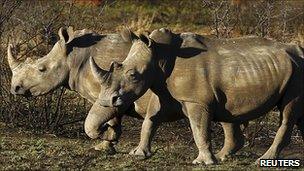South Africa troops tackle rhino poachers
- Published

Rhinos are killed for their horns in many parts of Africa
South Africa is to deploy hundreds of extra troops along its borders to help fight gangs smuggling rhino horns, the government has announced.
Justice Minister Jeff Radebe said four military companies would be sent to the borders with Zimbabwe, Swaziland and Lesotho.
Syndicates export the horns from Africa to parts of Asia and the Middle East.
In 2011, a record 450 rhinos were killed by poachers in South Africa, the Department of Environment Affairs says.
Mr Radebe said about 600 soldiers would join the fight against rhino poaching.
"The deployment includes army engineers who are conducting repairs and maintenance on the Zimbabwe-Mozambique border fence, which is approximately 140 kilometres (85 miles)," Mr Radebe said.
Last year troops were deployed along the Mozambican border, many of them inside the world-famous Kruger National Park where more than 200 rhinos were killed last year.
"Effective border management is part of the government crime prevention strategy, which assists to deal with cross-border crime syndicates and curb poaching," said Mr Radebe.
The number of rhinos killed in South Africa has soared in recent years to meet the demand for their horns in Asian traditional medicine, especially in China and Vietnam, where they are thought to have powerful healing properties.
But scientists say rhino horns are made from the same material as fingernails and have no proven medicinal properties.
Still, the demand for them has surged over the years; the black market price of rhino horn is now in the region of £35,000 ($55,000) per kg.
South Africa has become the focal point of the rhino trade because it has between 70 and 80% of the global population - about 20,000 animals.
The country's government has commissioned a study into whether legalising the trade in rhino horn could help reduce poaching.
- Published30 October 2011
- Published3 November 2011
- Published4 November 2011